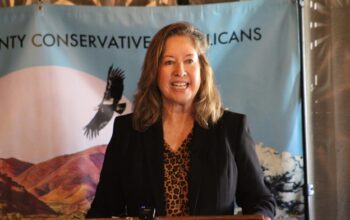This is the way capitalism works. Private businesses, not government, determine wage rates and benefits. In this case, a restaurant made a decision—that is the American Way.
“From the beginning, Ioroi and Toliao have been committed to paying the front and back-of-the-house the same hourly wage—currently, $20—and pooling tips across the entire staff. This approach is designed to address the pay gap that has historically divided servers and kitchen workers in restaurants, with the low wage back-of-the-house jobs often relegated to BIPOC and undocumented workers.”
Why Does This Wine Bar Pay Dishwashers $20 an Hour? The Answer Is ‘Very Simple,’ Owner Says

Written by Sarah Holtz, SF Standard, 4/19/23 https://sfstandard.com/arts-culture/why-does-this-wine-bar-pay-dishwashers-20-an-hour-the-answer-is-very-simple-owner-says/?utm_source=The+San+Francisco+Standard&utm_campaign=53b908f0a5-EMAIL_CAMPAIGN_2022_06_21_02_54_COPY_02&utm_medium=email&utm_term=0_f81e82e2a3-53b908f0a5-528457265
When beloved modern Californian restaurant Cassava pulled up roots from Balboa Street last October—moving to Columbus Avenue in North Beach—Outer Richmond residents were sad to see the eatery and its legendary Japanese breakfast go. Six months later, they finally have a silver lining. Partners Yuka Ioroi and Kris Toliao will resurrect the old location as The Wine Bar by Cassava with a soft opening planned for April 27.
As Ioroi told The Standard, she and Toliao held onto the Balboa Street space, hoping that another restaurateur might take over and they could focus on their single location in North Beach. After more consideration, Ioroi said they decided they were up for the challenge and began transforming the full-service restaurant into a sleek wine bar.
“We were originally looking for partners, but we have a specific approach to how we pay our staff,” she said.
From the beginning, Ioroi and Toliao have been committed to paying the front and back-of-the-house the same hourly wage—currently, $20—and pooling tips across the entire staff. This approach is designed to address the pay gap that has historically divided servers and kitchen workers in restaurants, with the low wage back-of-the-house jobs often relegated to BIPOC and undocumented workers.
Ioroi and Toliao, who met in Los Angeles in 2008 while Ioroi was working as a server and Toliao as a cook, said they witnessed that exploitation firsthand.
“At other places, I always felt weird taking $100 in tips home and then I saw the dishwasher making no tips,” Ioroi said, explaining that there was a language barrier in the kitchen where she worked in LA.
She and Toliao pioneered this equitable wage practice in San Francisco back in 2012. More than a decade later, several Bay Area restaurants have followed suit, like award-winning Zuni Café, which eliminated tips entirely in favor of a 20% pooled service charge in 2021.
Ioroi gave The Standard a sneak peak of what we can expect at the wine bar, which will favor classic wine-growing regions like Burgundy and Bordeaux. Diners can pair a glass with a selection of traditional wine bar bites, including charcuterie and cheese plates, sustainable caviar service and Cassava’s ever-popular burrata toast.
Yet, Ioroi said she’ll stay choosy about which bottles she’ll pour. She plans to emphasize female and BIPOC winemakers, who have historically had to fight for a place in the industry. Ultimately, she said Cassava’s goal is to work with wineries that take care of their workers, as the wine industry depends on the labor of immigrant and seasonal workers.
“Cash flow is like blood flow.” She said. “We don’t do anything in our company that’s made with resentment or blood-letting. We’re not being self-righteous; we just don’t want to be in an environment where people are being exploited.”
Still, Ioroi acknowledged that’s not an easy feat in a city like San Francisco.
“We’re serving dinner, and there are people outside who can’t eat here,” she said. “You live with that every day. We’re not saving everybody.”
In January, the James Beard Foundation announced that Ioroi and Toliao were semifinalists for the Outstanding Restaurateur Award—the only Northern California restaurateurs to be considered for the honor. Though Cassava’s owners did not advance to the final nominations, making it into the running for that particular category largely reflects Ioroi and Toliao’s founding principles.
Ioroi said that since Cassava first opened in 2012, the restaurant industry has done its fair share of soul searching in response to the #MeToo movement, the racial reckoning sparked by the 2020 killing of George Floyd and the pandemic—and that now, these equity issues feel more relevant to her work than ever.
“Our messaging is more acceptable than when we first opened, and new operators are now taking that model,” she said. “It’s a very simple, basic principle when you think about it. […] There are actual steps that you can take to make things better.”



